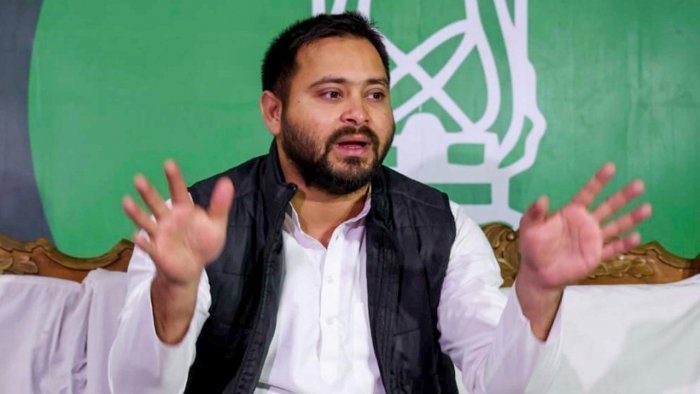In the aftermath of the Congress party’s remarkable triumph in the Karnataka Assembly elections, Bihar Deputy Chief Minister Tejashwi Yadav has once again emphasized the need for all opposition parties to come together in a united front against the Bharatiya Janata Party (BJP) in the upcoming 2024 Lok Sabha polls. Yadav’s call for opposition unity comes as he interprets the outcome of the Karnataka election as a clear message from the people, indicating their desire for a strong and cohesive opposition to counter the BJP’s dominance.
The recently concluded Karnataka Assembly elections witnessed a resounding victory for the Congress party, with its candidates securing a significant number of seats. This success has undoubtedly boosted the morale of the Congress and its allies, as they see it as a sign of growing disillusionment with the ruling BJP and its policies. Tejashwi Yadav, a prominent leader of the Rashtriya Janata Dal (RJD) in Bihar, has been an ardent advocate for opposition parties to set aside their ideological and regional differences and unite against the BJP.
Yadav’s call for opposition unity is not a new sentiment in Indian politics. The idea of a united opposition front has been proposed in the past as well, particularly during the 2019 Lok Sabha elections. However, achieving such unity has proven to be challenging, given the diversity of political parties and their individual ambitions. Nonetheless, Yadav remains optimistic about the prospects of opposition parties uniting to counter the BJP’s political dominance.
In his statement, Yadav stressed the importance of opposition parties transcending their narrow interests and joining forces to safeguard the democratic principles and institutions of the country. He emphasized the need for a strong opposition that can effectively hold the ruling party accountable and ensure that the government remains responsive to the concerns and aspirations of the people.
Yadav’s call for unity is not limited to the political realm; he also recognizes the significance of garnering public support for opposition parties’ efforts. He believes that opposition parties must work towards creating a narrative that resonates with the common people and addresses their pressing issues. By engaging with the electorate and understanding their concerns, the opposition can build a strong foundation of support and mobilize voters to rally behind their cause.
The Bihar Deputy Chief Minister’s call for opposition unity has received mixed reactions from various political parties across the country. While some leaders have expressed enthusiasm and optimism about the idea, others have expressed skepticism and raised concerns about the practicality of forging a united front.
One of the key challenges to opposition unity is the diversity of political ideologies and regional interests among the various parties. Finding a common ground on policy matters and prioritizing national interests over individual agendas can be a formidable task. Additionally, leadership dynamics and personal ambitions of prominent opposition leaders may hinder the process of building a cohesive coalition.
However, Tejashwi Yadav’s call for unity should not be dismissed outright. It serves as a reminder of the importance of a robust democracy that encourages healthy competition and checks and balances on those in power. The Congress party’s victory in Karnataka has demonstrated that a united opposition can pose a formidable challenge to the ruling party and its policies.
As the 2024 Lok Sabha elections approach, it remains to be seen whether opposition parties can overcome their differences and come together to present a strong alternative to the BJP. The road to opposition unity may be fraught with challenges, but Yadav’s call serves as a reminder that a united front is essential for a vibrant and inclusive democracy. The electorate will ultimately determine the success of such a coalition, and it is their support that will shape the political landscape of India in the coming years.


